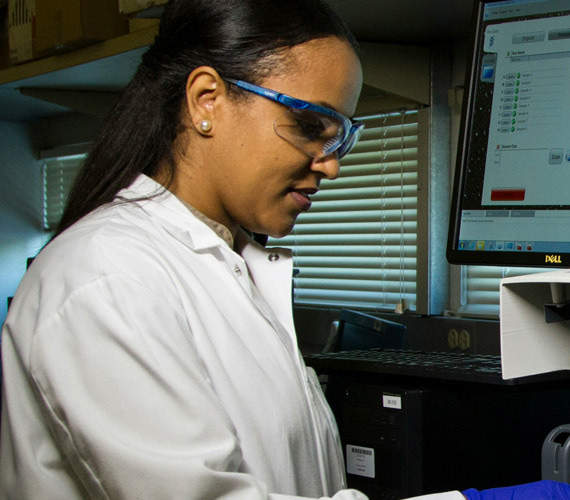When many people think about working in the field of public health, their minds immediately jump to community health workers and health educators who directly interact with members of the community to improve health outcomes.
But the truth is public health is an extremely varied field of work, with multiple potential career paths. One such career path that many people overlook is public health research—which ultimately goes on to inform and impact the public health projects performed by others.
Are you interested in potentially pursuing a career as a public health research assistant? Here’s an overview of what the job entails, where these professionals work, and the specific steps you’ll need to take to make your goal a reality.
What Does a Public Health Research Assistant Do?
A public health research assistant is an entry-level researcher who works on public health projects. They perform a range of different tasks, primarily related to the collection, organization, and analysis of data that informs various public health initiatives in the communities they serve.
Usually, these data will be related to analyzing health trends within a certain community, and then using those trends to:
- Inform policy
- Develop health assessment reports
- Disseminate findings through meetings, conferences, and research publications
- Design public health programs
At entry level, public health research assistants will typically begin by performing administrative tasks as they are trained on the processes that they will eventually be responsible for. Depending on the specific position, researchers may also take on a secondary role as health educators who use their findings to inform the public. Writing and oral communication skills are vital, as are computer literacy and math/statistics. Courses such as research methods and epidemiology can also help.
Other job titles that you might find on job postings for public health research assistants include:
- Public Health Researcher (I)
- Public Health Research Coordinator
- Public Health Data Analyst (I)
Where Do Public Health Research Assistants Work?
Public health research assistants can be employed by any organization that engages in public health projects or initiatives. This can include:
- Hospitals
- Long-term care facilities
- Community health clinics
- Specialized clinics (such as cardiac centers)
- Senior centers
- Eldercare services
- Women's health centers
- Breastfeeding clinics
- Universities
- Government agencies at the state and local level
How Much Do Public Health Research Assistants Make?
Public health research assistants tend to earn an average of $38,433 per year according to Zippia. This figure is a good representation of the entry-level salary that you can expect in this field.
As researchers gain experience and further their skills, however, pay tends to increase and reflect this. PayScale.com notes that the more senior-level researchers can earn $68,000 or more per year.
Three Steps to Becoming a Public Health Research Assistant
If you’re interested in becoming a public health research assistant, it’s important to be aware of the educational and experience requirements. Here are three steps to becoming a public health research assistant.
1. Earn a Bachelor’s Degree in Public Health
Most employers that hire public health research assistants require applicants to hold at least a bachelor’s degree in public health or a related field. This degree is specifically designed to provide exposure to research practices, which will form the foundation of any research-focused career.
If you choose not to earn a degree in public health but are interested in a career as a research assistant, it will be important for your degree to provide at least some training and exposure to basic research practices.
2. Gain Research Experience
As mentioned above, you should take every opportunity during your studies to gain research experience, as this will directly translate over into the job. Some excellent options include:
- Internships
- Co-ops
- Independent research with a faculty member
With this in mind, when evaluating programs, it’s important to consider the research opportunities that the program will provide.
In the BA in Public Health program at Regis College, for example, students complete an average of 240 hours of hands-on field experience through internship placements at hospitals, community agencies, health care organizations, and nonprofit organizations where research opportunities are available.
In addition, nearly all courses in the public health curriculum incorporate research skills through readings, assignments, and discussions. Faculty are also actively engaged in research efforts that can include students.
Additionally, you should look for a program that offers courses and curriculum related to research. It can be very beneficial, for example, to complete courses that involve survey building and data analytics.
If it’s not possible to gain any research experience as you complete your degree, consider finding an entry-level position as a community health worker or public health educator, that will allow you to conduct some research-related tasks. If you express interest to your employer, many will find a way to help you explore it.
3. Consider Advancement
While you should be able to get an entry-level research position with just your bachelor’s degree in public health, more senior-level research positions will typically require additional training and education. Most commonly, this will involve earning a master’s in public health (MPH).
Earning a master’s degree in public health will be particularly important if you would like to lead research projects and actually design studies. It can also increase your earning potential, and help you stand out in job applications.
How to Make an Impact in Public Health
Public health research assistants play a crucial role in the field of public health. The projects that they work on and the data they collect and analyze form the bedrock of the entire profession. This means that by pursuing a career in public health research, you’ll have the opportunity to have a real impact in the communities that you serve.
If you’re ready to begin your public health journey, the first step is to complete a relevant undergraduate degree, such as Regis College’s Bachelor of Arts in Public Health. This program will provide the knowledge and skills you need to pursue a career in public health, as well as real-world experience through community engagement and service opportunities.




